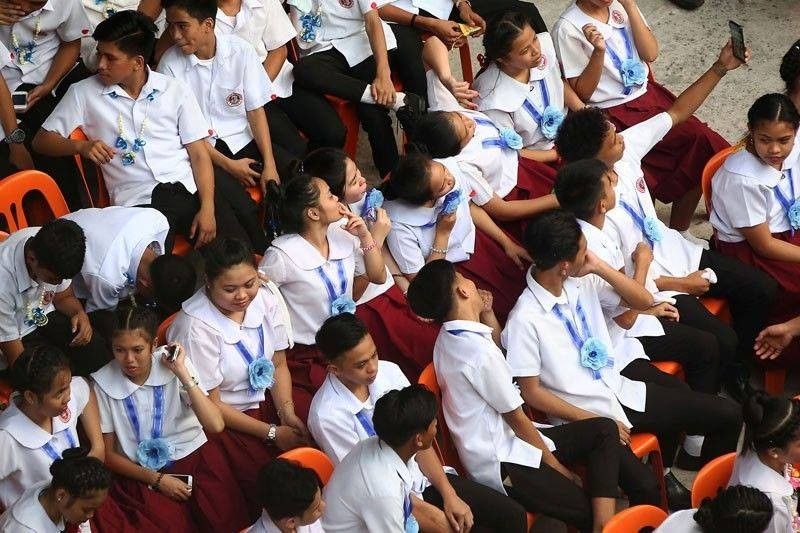La Salle Greenhills opens doors to girls

MANILA, Philippines — Starting this year, female students will be accepted to the senior high school program of La Salle Greenhills (LSGH) in Mandaluyong City.
The LSGH board approved the shift of its senior high school program to coeducation as part of the transition to an integrated school this year, school president Edmundo Fernandez said in a letter to the community this week.
LSGH has been an all-boys school since it was founded in 1959.
According to Fernandez, tuition subsidy will be offered to the first 20 female applicants for the coming school year.
He said the enrollment for new and continuing students may be conducted online.
“We understand that the current situation is difficult for everyone within and outside our LSGH community. The 9.5 percent tuition increase for school year 2020-2021, recommended by the multi-sectoral committee and approved by the Board of Trustees, will not push through,” read the letter.
“We will also be reducing our miscellaneous fees, in solidarity with you and the varied institutions whose initiatives are directed towards helping alleviate these difficulties for their clients as well as for their employees,” it added.
LSGH is not the first exclusive school that has adopted a coeducational system in some of their programs.
In 2016, the Ateneo de Manila high school opened its doors to female students when it started offering a senior high school program.
At the time, Ateneo president Jett Villarin said the coed nature for Grades 11 and 12 would serve as preparation for college.
Ateneo remains an exclusive school for boys from kindergarten to Grade 10.
Miriam College, which operates an all-female school in Quezon City, offered coeducational basic education program in its campus in Nuvali, Laguna when it opened in 2014.
While its campus in San Juan remains an all-boys school, Xavier School also decided to offer a coeducational basic education program in its campus in Nuvali, Laguna when it opened in 2012.
Flexible learning
In his letter to the LSGH community, Fernandez said LSGH would adopt a flexible education system in light of the coronavirus disease pandemic.
Called Flexible Lasallian Education through Technology and Collaboration at Home or FLETCH, the system would involve a mix of home-based learning and face-to-face education.
Classes will open on a staggered basis between July 20 and Aug. 10.
For the first trimester of the school year, LSGH will adopt home-based online learning using the school’s learner management system.
“Quality of learning is ensured by following a standard rubric that covers course introduction, learning objectives, assessment, instructional materials, learner engagement, technology, learner support and accessibility,” said LSGH.
“Assessments are authentic where learning outcomes and reasonable performance expectations are clear and communicated, and feedback on student performance is timely. Periodical examinations are postponed for the first trimester. Letter grades are adopted,” it added.
LSGH is one of the first schools that cancelled final examinations in March due to the pandemic.
It also converted some of its facilities and raised funds for healthcare personnel of The Medical City (TMC).
“The LSGH has agreed to open its doors to provide a temporary safe shelter for about 100 of the hospital’s healthcare workers. LSGH will provide makeshift sleeping areas with access to clean bathrooms and internet connection to allow the healthcare workers to contact their respective families,” Fernandez said in a letter to the community in April.
“TMC, in turn, will provide equipment and materials to disinfect its personnel as soon as they enter the campus and to periodically disinfect the areas assigned to the healthcare workers,” he added.
Fernandez said they have ensured the regular sanitation of their facilities and have put in place the necessary health and safety standards.
“Once we have determined the resumption of office operations pursuant to clearance from local and health authorities, we assure everyone that health and safety standards for our students, personnel and guests as well as the fitting of our facilities are in place as part of our ongoing preparations for the opening of our campus,” he added.
Stipends released
Meanwhile, the Department of Budget and Management (DBM) has approved the release of over P3.6 billion for stipends of more than 120,000 students enrolled in private universities and colleges.
The amount covers the partial payment of the Tertiary Education Subsidy to beneficiaries enrolled in 404 private higher education institutions for the first semester of school year 2019-2020.
Commission on Higher Education (CHED) chairman J. Prospero De Vera III said they have instructed the schools to immediately coordinate with the students on how to best distribute the stipends.
He said the commission would immediately download the funds to the remaining higher education institutions as soon as these are released by the DBM.
The subsidy to students in private tertiary institutions is a component of Republic Act 10931, which institutionalized free higher education in state universities and colleges.
Under the program, financially-needy students in private schools are provided with subsidy of up to P60,000 per year to cover for tuition, miscellaneous and other education expenses.
In a related development, De Vera said the implementation of the free higher education law would continue even with the adjustments in the education system due to the coronavirus disease pandemic.
De Vera said learning outcomes would remain the same even with the shift to flexible learning systems due to the public health emergency.
“I think there is a misconception that when you go flexible learning, no one would have to go to school. That is not true,” he said during a Laging Handa briefing.
“The intent of flexible learning is to decongest the classrooms, to reduce the number of students who go to the classroom at one time so social distancing and the health of the students can be protected,” he added.
In his previous advisories, De Vera encouraged tertiary institutions to deploy available distance learning, e-learning and other alternative modes to deliver education to students.
He reiterated, however, the need to take into account the availability of the needed resources such as online connectivity of students and faculty.
In addition to using online-based systems, flexible learning may also use non-digital technology such as radio to allow education to continue even without internet connectivity.
Printed modules containing reading materials and tasks may also be provided to students.
- Latest
- Trending





























